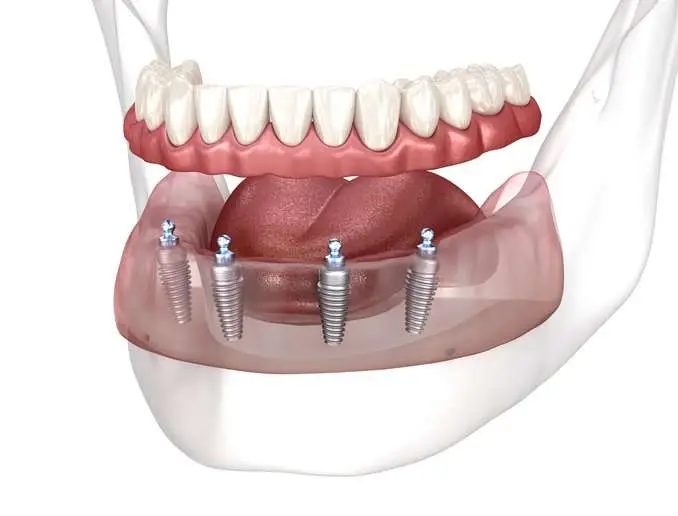What Does It Feel Like to Have Dental Implants?
Many patients wonder, ‘What do dental implants feel like?‘ and ‘Do dental implants feel natural?‘ These questions are at the heart of considering dental implants as a tooth replacement option. Dental implants feel like real teeth, unlike traditional dentures, which can be uncomfortable and strange.
This article discusses what implants feel like, from the initial procedure to everyday life, explaining how and why they think and function indistinguishably from natural teeth.
Home » Frequently Asked Questions » How Does It Feel Like to Have Dental Implants?
Table of Contents
Understanding the Healing Process: Ensuring Success with Oral Hygiene and Natural Integration
Healing after getting a dental implant is key to its success and longevity. This period not only involves the integration of the implant into the jawbone, which is crucial for the implant to bond with the jawbone, but good oral hygiene is also needed to keep the remaining natural teeth and gums healthy to prevent bone loss.
- Oral Hygiene: Maintaining impeccable oral hygiene is paramount during the healing phase. The goal is to prevent infection and ensure the health of the surrounding gum and any remaining natural teeth. Regular brushing, flossing, and using antiseptic mouthwash help safeguard the implant site and promote healing.
- Natural Tooth and Bone Preservation: A dental implant replaces a missing tooth’s root and supports the new fake tooth, called a prosthetic tooth. This not only helps restore your smile but also plays a vital role in preventing bone loss. The implant stimulates the jawbone much like a natural tooth root, maintaining its density and integrity and providing the necessary stimulation for bone renewal and remodeling. Thus, it preserves the jawbone’s health and structure, ensuring the continued support and stability of surrounding teeth and facial features.
- Healing Process and Sensations: At first, the area around the implant may feel uncomfortable and sensitive to pressure, heat, or cold. These sensations are typical in the first weeks immediately after the surgery. They are a normal part of the healing process. They should diminish as the implant integrates with the bone—a process known as osseointegration. This integration is critical for the implant to become a stable and enduring part of your mouth, mimicking the function and feel of a natural tooth.
- The Role of the Surrounding Gum: The health of the gum surrounding the implant is also crucial for the healing process. Proper care and hygiene help prevent gum recession or infection, which could affect the stability of the implant. The goal is for the implant to seamlessly blend with the surrounding gum and the rest of your teeth, contributing to a natural and comfortable feel.
- Adapting to Changes: Throughout the healing period, it’s essential to follow your dentist’s advice. That’s why counting on a good professional is so important, and at Smile24h, we always recommend one of our Smile24h Expert Clinics, also known as Certified ZAGA Centers. ZAGA dental professionals will advise on diet and oral care practices, following the ZAGA Philosophy based on tailored treatments and a “patient-first” focus. This ensures that the area heals correctly and that the dental implant replaces the function of your missing tooth without any issues, allowing you to enjoy a restored smile.
By focusing on these aspects of the healing process, patients can significantly contribute to the success of their dental implants, ensuring that they not only restore functionality but also feel natural and comfortable in the long run.


Will I Feel the Dental Implants?
Once dental implants get a crown, bridge, or denture, implants feel just like your natural teeth. In the beginning, you might feel uncomfortable or sensitive. The critical step after surgery is when the implant and bone fuse together, making the implant stable in your jaw and a regular part of your mouth. This fusion takes 3 to 6 months, but you won’t feel much during this time and can go about your day as usual.
It is difficult to notice the progress of osseointegration from the patient’s perspective until they revisit their clinician to see if the dental implants have fully stabilized.
Ultimately, the implants should not make you feel anything once placed in the jaw. You may feel tenderness in and around the implant area immediately after surgery, but this usually stems from the gum tissue, not the implant.
Eating and Speaking with Dental Implants
You might need time to adjust to prosthetic teeth or tooth replacement with dental implants, and you may initially feel discomfort or produce more saliva than usual. Before long, these new teeth will function and feel just like natural ones, providing a comfortable bite and a familiar sensation. Typically, you’ll adapt quickly.
At first, you should stick to soft foods and find speaking a bit different. But once you adjust to them, you can communicate clearly and eat almost anything, thanks to the solid and effective dental implants.







